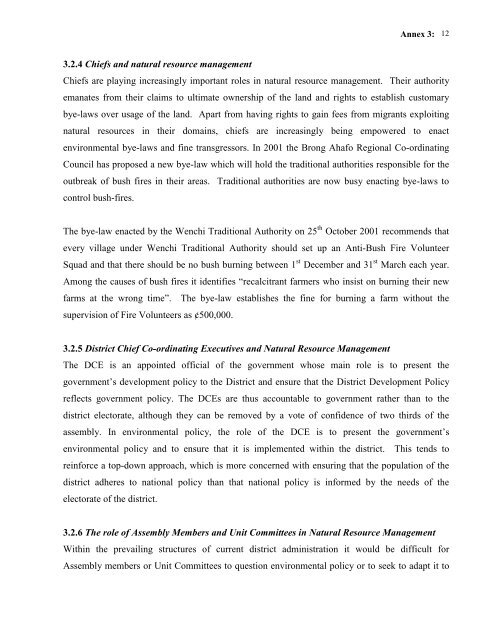Poverty Dimensions of Public Governance and Forest Management ...
Poverty Dimensions of Public Governance and Forest Management ...
Poverty Dimensions of Public Governance and Forest Management ...
Create successful ePaper yourself
Turn your PDF publications into a flip-book with our unique Google optimized e-Paper software.
Annex 3: 12<br />
3.2.4 Chiefs <strong>and</strong> natural resource management<br />
Chiefs are playing increasingly important roles in natural resource management. Their authority<br />
emanates from their claims to ultimate ownership <strong>of</strong> the l<strong>and</strong> <strong>and</strong> rights to establish customary<br />
bye-laws over usage <strong>of</strong> the l<strong>and</strong>. Apart from having rights to gain fees from migrants exploiting<br />
natural resources in their domains, chiefs are increasingly being empowered to enact<br />
environmental bye-laws <strong>and</strong> fine transgressors. In 2001 the Brong Ahafo Regional Co-ordinating<br />
Council has proposed a new bye-law which will hold the traditional authorities responsible for the<br />
outbreak <strong>of</strong> bush fires in their areas. Traditional authorities are now busy enacting bye-laws to<br />
control bush-fires.<br />
The bye-law enacted by the Wenchi Traditional Authority on 25 th October 2001 recommends that<br />
every village under Wenchi Traditional Authority should set up an Anti-Bush Fire Volunteer<br />
Squad <strong>and</strong> that there should be no bush burning between 1 st December <strong>and</strong> 31 st March each year.<br />
Among the causes <strong>of</strong> bush fires it identifies “recalcitrant farmers who insist on burning their new<br />
farms at the wrong time”. The bye-law establishes the fine for burning a farm without the<br />
supervision <strong>of</strong> Fire Volunteers as ¢500,000.<br />
3.2.5 District Chief Co-ordinating Executives <strong>and</strong> Natural Resource <strong>Management</strong><br />
The DCE is an appointed <strong>of</strong>ficial <strong>of</strong> the government whose main role is to present the<br />
government’s development policy to the District <strong>and</strong> ensure that the District Development Policy<br />
reflects government policy. The DCEs are thus accountable to government rather than to the<br />
district electorate, although they can be removed by a vote <strong>of</strong> confidence <strong>of</strong> two thirds <strong>of</strong> the<br />
assembly. In environmental policy, the role <strong>of</strong> the DCE is to present the government’s<br />
environmental policy <strong>and</strong> to ensure that it is implemented within the district. This tends to<br />
reinforce a top-down approach, which is more concerned with ensuring that the population <strong>of</strong> the<br />
district adheres to national policy than that national policy is informed by the needs <strong>of</strong> the<br />
electorate <strong>of</strong> the district.<br />
3.2.6 The role <strong>of</strong> Assembly Members <strong>and</strong> Unit Committees in Natural Resource <strong>Management</strong><br />
Within the prevailing structures <strong>of</strong> current district administration it would be difficult for<br />
Assembly members or Unit Committees to question environmental policy or to seek to adapt it to
















